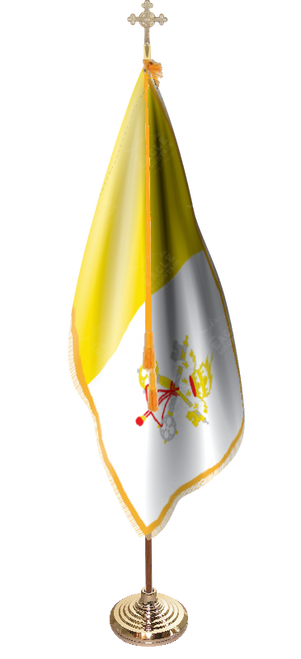Product Description
This Christian Flag Indoor and Parade Flag Set features a 4' x 6' flag with a 9' oak pole and a 7.5" brass cross ornament. Sets come with gold fringe and cord w/ tassels.
The flag's most conspicuous symbol is the Christian cross, the most universal symbol for Christianity. The red color represents the blood of Christ and brings to mind his crucifixion. Christians believe that Jesus Christ's death and resurrection is the means God uses to save believers from their sins. The cross and blood have been used since earliest Christianity to symbolize salvation through Jesus.
The white field draws on symbolism throughout the Bible equating white clothes with purity and forgiveness. People who have been "washed white as snow" in the Bible have been cleansed from their sins (Isaiah 1:18; Psalm 51:2). In conventional vexillology (the study of flags, their history and symbolism), a white flag is linked to surrender, a reference to the Biblical description Jesus' non-violence and surrender to God's will.
The symbolism behind the blue canton has been interpreted to represent Heaven, truth, or the Christian ritual of Baptism in water. Since the flag is not tied to any specific denomination or church institution, it represents the unity of all Christians despite historical, cultural, and dogmatic differences. Its simplicity makes it easily copied by any community of Christians.
The featured speaker failed to arrive for the Sunday School Rally in a Coney Island Chapel in 1897, and - the Christian flag was born:
Like so many of the great and memorable things of history, a Christian flag was not contemplated or predesigned. A fortuitous happenstance gave it birth. The Sunday School was holding an old-fashioned Rally Day of the kind which was so much the custom in years past. For this occasion, a favored speaker had been engaged, but for some reason undisclosed did not show up. Superintendent Charles C. Overton, in the emergency, called upon his own gifts of innovation to fill in the time. An American flag lay there across the pulpit. Overton addressed his words to the flag and its symbolism. Then like a flash came the thought, why not also a Christian flag? His impromptu but constructive ad-libbing was to produce a verbal picture of what is today, and for the past one hundred years has been, the Christian flag.
Today the Christian flag is one of the oldest unchanged flags in the world. It was conceived at Brighton Chapel, Coney Island, New York, Sunday, September 26, 1897, and was presented in its present form the following Sunday by its originator. Call it chance, or providence, serendipity, or the plan of God. On that day, the Christian flag was born.







